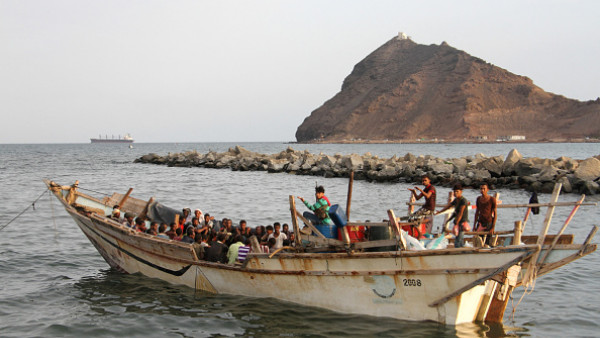Scores of migrants from the Horn of Africa attempt to cross into Yemen, in a bid to make it to the oil-rich Gulf [Getty/file photo]
A boat carrying more than 200 migrants sank off Yemen, leaving at least 49 dead, mostly women and children, in the latest disaster on the perilous migration route from Africa, a UN agency said Tuesday.
“At least 49 migrants have died and 140 others remain missing after a boat” carrying 260 people capsized off the southern province of Shabwah on Monday, the International Organization for Migration (IOM) said.
It said 31 women and six children were among those confirmed dead, adding that 115 Somali nationals and 145 Ethiopians were initially on board the vessel before it sank.
“Search and rescue operations are ongoing despite significant challenges due to a shortage of operational patrol boats,” the IOM said.
The boat departed from Bossaso in Somalia at around 3 am (0000 GMT) on Sunday amid a “recent rise in migrants from the Horn of Africa travelling to Yemen,” the UN agency said.
Each year many tens of thousands of migrants from the Horn of Africa set off across the Red Sea in a bid to reach the oil-rich Gulf, escaping conflict, natural disasters or poor economic prospects.
In 2023 alone, the IOM observed more than 97,200 migrant arrivals in Yemen, it said.
In April, two boats sank off the coast of Djibouti just two weeks apart, leaving at least 62 dead, according to the UN agency.
The IOM said on Tuesday it had recorded 1,860 migrant deaths and disappearances along the migration route since 2014, including 480 due to drowning.
The latest “tragedy is another reminder of the urgent need to work together to address urgent migration challenges and ensure the safety and security of migrants along migration routes,” said agency spokesperson Mohammedali Abunajela.
Those migrants who successfully reach Yemen often encounter further threats to their safety. The Arabian Peninsula’s poorest country has been mired in civil war for a decade.
Many are trying to reach Saudi Arabia and other Gulf Arab countries where they can work as labourers or domestic workers.
In August, Human Rights Watch accused Saudi border guards of killing “at least hundreds” of Ethiopians trying to cross into the Gulf kingdom from Yemen between March 2022 and June 2023, using explosive weapons in some cases.
Riyadh dismissed the group’s findings as “unfounded and not based on reliable sources”.
In a report last week, the Mixed Migration Centre said hospitals in Yemen continued to receive migrants injured in attacks along the border and that at least some killings continued.
The group, which aims to provide independent research on migration, said it had “only been able to interview a small number of Ethiopian returnees” and that comprehensive data was “extremely difficult to obtain”.
Therefore “it is impossible to say whether proportionally the extent of migrant killings has reduced compared to one year ago,” the group said.
“However, even if central Saudi authorities would have instructed border guards to reduce or end the killings, MMC found that the killing of Ethiopian migrants by Saudi security officials has been continuing.”
The IOM said last month that, despite the many dangers of the migration route, the number of migrants arriving in Yemen “tripled from 2021 to 2023, soaring from approximately 27,000 to over 90,000.”


